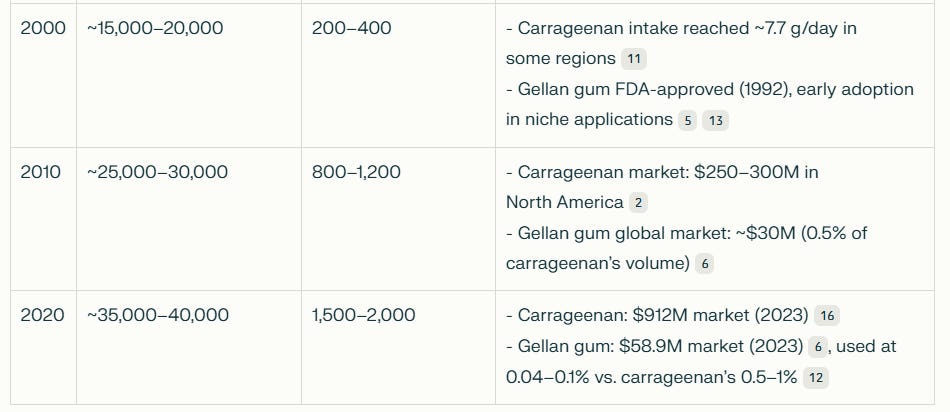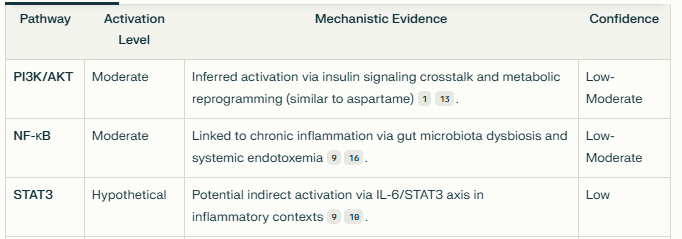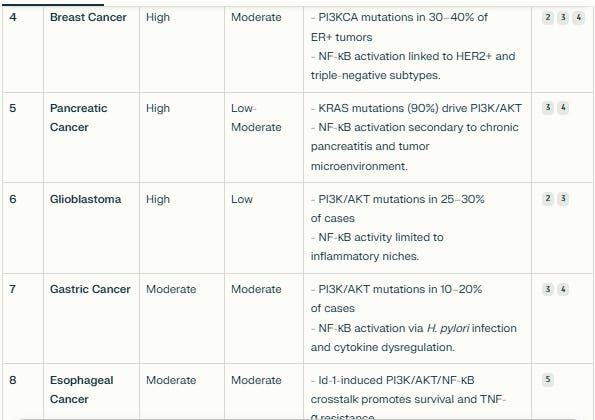Recently AI ranked Ivermectin #1 in CSC Metastatic Pathway blocking.
Today AI ranks the Top Food Ingredients that stimulate cancer pathways.
The #8 CSC Activating Hidden Food Additive
I always thought that a natural agent derived from seaweed could not possibly cause cancer. But AI proved me wrong. However, I had to dig to find the information.
Whenever AI provides a “might” or “suggests” result, look a little deeper which is what I did with this follow-up question:
Here is the more detailed and informed answer which implicates carrageenan in metastases and strong WNT pathway stimulation:
Carrageenan stimulates multiple CSC pathways including WNT, NF-kB and p13/AKT after all. But it also stimulates the TGF beta which the above search missed. Here it is:
Carrageenan stimulates TGF beta, which I refer to as the “Double Agent” in my book. Along with TGF beta, I also review EMT, epithelial mesenchymal transformation, the process of metastases.
But I digress.
There is more.
Carrageenan, the stuff from seaweed that they place in ice cream is not only a cancer-causing agent, but it also stimulates metastatic cancer CSC pathways in colon cancer and promotes immune evasion in hormone-sensitive cancers. It is a bad actor, but far from the worst.
Let me digress one last time.
Last Digression: Carrageenan’s Alternative: Gellan Gum: Made from Pseudomonas
You may be happy to know that carrageenan is being slowly and quietly replaced as an emulsifier by gellan gum, courtesy of our dear friends at Merck. Invented in 1982, this food additive had not really gained traction in the food market for a few reasons.
Perhaps the main one was that it was derived from Pseudomonas, that deadly pathogenic bacteria that causes so many antibiotic-resistant infections.
Yes, you heard correctly. Gellan gum is derived from the bacteria, Pseudomonas Elodea, and this isn’t such a great marketing fact. However, the kind folks at our FDA had a hand in quietly changing the name. The bacterium originally named Pseudomonas elodea was reclassified into the genus Sphingomonas in 1995.
So, in 1995, consumers began buying their favorite ice creams - in droves - made from Pseudomas Elodea - excuse me - Sphingomonas Elodea.
Here is how popular it has become - and just picture in your mind’s eye those giant vats of Pseudomonas bacteria brewing a creamy additive that will be mixed up in your favorite Mint & Chip Chocolate Ice Cream. Maybe also in your favorite Whipping Cream. By the way, did I mention gellam gum containing foods enjoy the label “organic?”
Enough digression.
The #7 CSC Activating Hidden Food Additive
On to the #7 metastatic cancer-causing food additive.
Whenever you see “limited direct evidence” always dig deeper.
Here is the truth about Red Dye #3 and Red Dye #40, and it is ugly.
Both red dyes strongly activate multiple CSC pathways and are highly metastases promoting, especially in colon, breast, and thyroid cancers.
The #6 CSC Activating Hidden Food Additive
Now we move up the list to the # 6 most CSC metastasis promoting hidden food additive - saccharine.
Once again, when AI says “limited” it may mean the evidence exists. So, I dug deeper and there was substantial evidence, particularly in pathways that stimulate colon cancer.
Saccharin activates multiple CSC pathways with high stimulation of NF-kB, moderate stimulation of p13/AKT, and low stimulation of WNT.
The #5 CSC Activating Hidden Food Additive
Let us now move up to the #5 CSC metastasis promoting agent hidden in our foods - Sucralose.
Once again, do not accept “limited” as an AI search result. It usually means there is more, but unless you ask the question precisely, the answer will remain hidden.
Here is what the detailed AI search revealed:
Sucralose moderately stimulates the MAPK/ERK CSC Sub Pathways and suppresses T cell immunity aggravating cancer risks.
What cancers are stimulated by MAPK/ERK pathways you might ask? The answer is Leukemia, Melanoma, and Thyroid.
But sucralose is not the major offender by far.
The top four agents are those that everyone must know about. Because these have been suppressed for much too long, and for many of us, there is still time to stop consuming these.
The #4 CSC Activating Hidden Food Additive
The #4 CSC metastasis promoting agent is Acesulfame.
Once again, AI seems to be hiding the ball. So, I dug in with a more precise AI search, and once again, I found.
A moderate activator of CSC pathways, Acesulfame moderately stimulates p13/AKT and NF-kB pathways which are linked to metastases in many cancers. Anyone who wishes to avoid cancer should stay far away from Ace-K in my opinion.
What cancers are driven most by p13/AKT and NF-kB? Allow me to display AI’s answer:
Now for the #3 CSC metastatic pathway stimulating hidden food agent.
Titanium Dioxide is one of the ingredients we often see on a label yet are not sure if it is bad for us. However, from this day forward, know that it is among the worst of the worst CSC cancer causing agents you might consume - according to AI.
Don’t just take my word for it.
And AI, while it cannot lie [usually], it can tell you that it has “limited” information or does not possess “direct” information in the “provided sources” which should always alert you there is more information hiding.
The #3 CSC Activating Hidden Food Additive
Here is the dirt on #3 Titanium Dioxide. It is implicated in CSC pathways that stimulate Renal, GI, and Bone cancers:
Keep in mind that TiO2, Titanium Dioxide, is contained many of our favorite foods.
Here is a list courtesy of AI:
But now on to the #1 and #2 hidden food additives that AI ranks as the most potent stimulators of metastatic cancer.
Keep reading with a 7-day free trial
Subscribe to Repurposed Drugs: Powers & Possibilities to keep reading this post and get 7 days of free access to the full post archives.

































